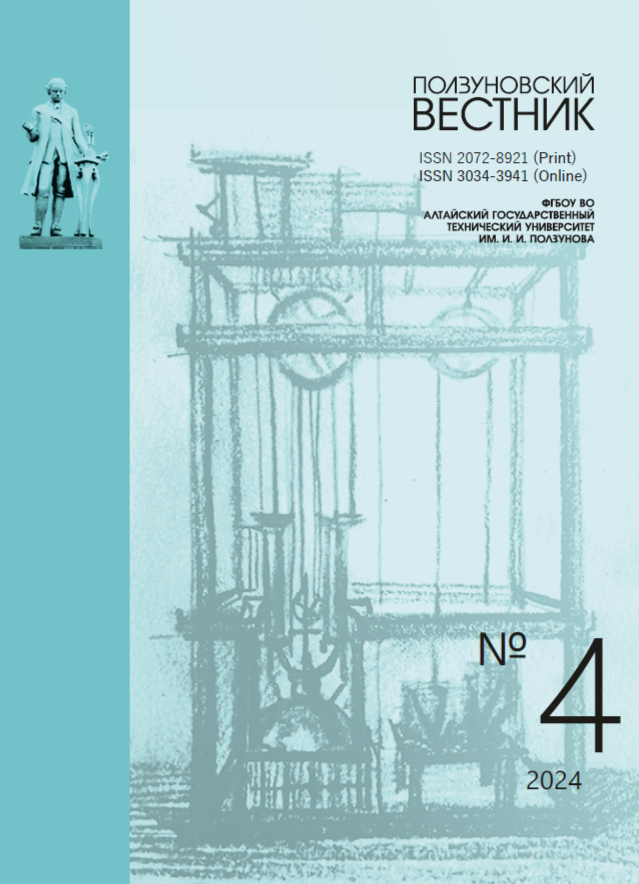THE INFLUENCE OF MOISTURE CONTENT ON THE QUALITY IN-DICATORS OF RICE EXTRUDATES WITH JERUSALEM ARTI-CHOKE BY-PRODUCTS OBTAINED IN ETHANOL TECHNOLOGY
SWASNU
DOI:
https://doi.org/10.25712/ASTU.2072-8921.2024.04.010Keywords:
Jerusalem artichoke, alcohol technology, dispersed fraction, secondary raw materials, extrusion, quality indicators, instant productsAbstract
The prospects of processing Jerusalem artichoke into alcohol and its use in other bioconversion technologies have been shown by many studies. The actual task is the utilization of the generated by-products. The aim of the work was to study the influence of the moisture content of mixtures of rice cereal and 6% of the dried dispersed fraction of Jerusalem artichoke as by-product of alcohol technology on extrusion modes, technological parameters of extrudates considered as the basis for instant products. The resulting extrudates were evaluated according to the following qualitative characteristics: expansion index, bulk density, hardness, number of microfractures, color characteristics in the CIE Lab system, solubility, swelling. The results showed that key extrusion indicators increased with a decrease in moisture of mixture from 20% to 12.5%: the extrusion temperature - from 155 to 170 ° C, pressure - from 2.0 to 4.0 MPa, torque - from 48 to 80%, and specific mechanical energy - by 67% from 0.109 to 0.182 kW·h/kg. The level of moisture content correlated with the bulk density of extrudates and their hardness, which increased from 73.5 to 227.2 g/dm3 and from 4.4 to 41.7 N, respectively with an increase in moisture content from 12.5 to 20%. An inverse correlation was noted for other indicators: the number of microfractures decreases from 11.8 to 4.7, the expansion coefficient from 13.7 to 4.1, the swelling index from 10.4 to 7.2 cm3/g and solubility from 80 to 49%. The dynamic viscosity of extrudate suspensions simulating the preparation of instant porridges in domestic conditions decreased from 3.3 to 2.0 Pa s with a decrease in moisture content. It has been established that the introduction of a dispersed fraction of Jerusalem artichoke increases the porosity of the product and changes the color characteristics of the samples. Research has shown the prospects of using the dispersed fraction of Jerusalem artichoke in the extrusion technology of instant products in order to increase the content of dietary fiber.
References
Рудась П. Г. Маркетинговые исследова-ния российского рынка пищевых продуктов быст-рого приготовления // Известия вузов. Пищевая технология. 2006. №4. С. 108-110
Мелешкина Л. Е., Иунихина В. С., Вайта-нис М. А. Изменение углеводного комплекса пер-ловой и гречневой крупы быстрого приготовления в процессе баротермического текстурирования // Ползуновский вестник. 2012. №2/2. С. 117 – 121.
Булганина С.В., Лебедева Т.Е., Головано-ва С.О., Домнина А.И. Рынок круп в россии: дина-мика развития и факторы спроса // Московский экономический журнал. 2020. №2. С.249-256
Adekola, K.A.. (2016). Engineering Review Food Extrusion Technology and Its Applications // Journal of Food Science and Engineering. 2016. №6. Р. 149-168. DOI:10.17265/2159-5828/2016.03.005.
Vivian Offiah, Vassilis Kontogiorgos & Ko-lawole O. Falade Extrusion processing of raw food materials and by-products: A review // Critical Re-views in Food Science and Nutrition. 2019. V.59. №18. P. 2979-2998. DOI: 10.1080/10408398.2018.1480007
Шариков А.Ю., Амелякина М.В. Модифи-кация углеводов сельскохозяйственного сырья в процессе термопластической экструзии (обзор) // Аграрная наука Евро-Северо-Востока. 2021. Т.22. №6. С. 795-803. DOI: 10.30766/2072-9081.2021.22.6.795-803
Singh, Shivendra & Gamlath, Shirani & Wakeling, Lara. Nutritional aspects of Food extru-sion: A review // International Journal of Food Sci-ence & Technology. 2007. V.42. P.916- 929. DOI: 10.1111/j.1365-2621.2006.01309.x.
Nyombaire, George & Siddiq, Muhammad & Dolan, K.D. Physico-chemical and sensory quality of extruded light red kidney bean (Phaseolus vulgaris L.) porridge // LWT - Food Science and Technology. 2011. V.44. №7. Р.1597-1602. DOI:10.1016/j.lwt.2011.02.016.
Akande, Olamide A et al. Optimization of ex-trusion conditions for the production of instant grain amaranth-based porridge flour // Food science & nutrition. 2017. V.5. №6. P.1205-1214. doi:10.1002/fsn3.513
Патент №2541402 Российская федера-ция, Способ производства Каш с топинамбуром/ В.Н. Макаров, М.Ю. Акимов, Л.Н. Влазнева, В.А. Кольцов // заявитель и патентообладатель Мичу-ринский государственный аграрный университет. – №2013141384; приоритет от 09.09.2013; заре-гистрировано 29.12.2014 г
Kim H. S., Hwang E. S. Quality Characteris-tics and Antioxidant Activity of Brown Rice Porridge Supplemented with Jerusalem Artichoke (Helianthus tuberosus L.) // Journal of the Korean Society of Food Science and Nutrition. 2022. V 51.№4. P. 352-359. https://doi.org/10.3746/jkfn.2022.51.4.352
Sawicka B., Skiba D., Pszczółkowski P., Aslan I., Sharifi-Rad J., Krochmal-Marczak B. Jerusa-lem artichoke (Helianthus tuberosus L.) as a medici-nal plant and its natural products // Cellular and mo-lecular biology Noisy-le-Grand. 2020. V. 66. №4. P. 160–177.
Абрамова И. М., Туршатов М.В., Кривчен-ко В. А. [и др.] Исследование биохимического со-става топинамбура и получаемых на его основе этилового спирта и пищевых функциональных продуктов // Биотехнология. 2022. Т.38. №4. С.56-61. – DOI 10.56304/S0234275822040020.
Ainsworth, P., İbanoğlu, Ş., Plunkett, A., İbanoğlu, E., & Stojceska, V. Effect of brewers spent grain addition and screw speed on the selected physical and nutritional properties of an extruded snack // Journal of Food Engineering. 2007. V.81. №4. P. 702-709. https://doi.org/10.1016/j.jfoodeng.2007.01.004
Stojceska V., Ainsworth P., Plunkett A., İbanoğlu Ş. The advantage of using extrusion pro-cessing for increasing dietary fibre level in gluten-free products // Food Chemistry. 2010. V.121. №1. P.156-164 10.1016/j.foodchem.2009.12.024.
Mosha, A., Svanberg, U. Preparation of Weaning Foods with High Nutrient Density Using Flour of Germinated Cereals // Food and Nutrition Bulletin. 1983. Т.5. №2. P.10-14.
Downloads
Published
How to Cite
Issue
Section
License
Copyright (c) 2024 Anton Y. Sharikov, Maria V. Amelyakina, Viktor V. Ivanov, Mikhail V. Turshatov, Alexander O. Solovyov, Irina M. Abramova

This work is licensed under a Creative Commons Attribution 4.0 International License.















 .
. This work is licensed under a
This work is licensed under a 
